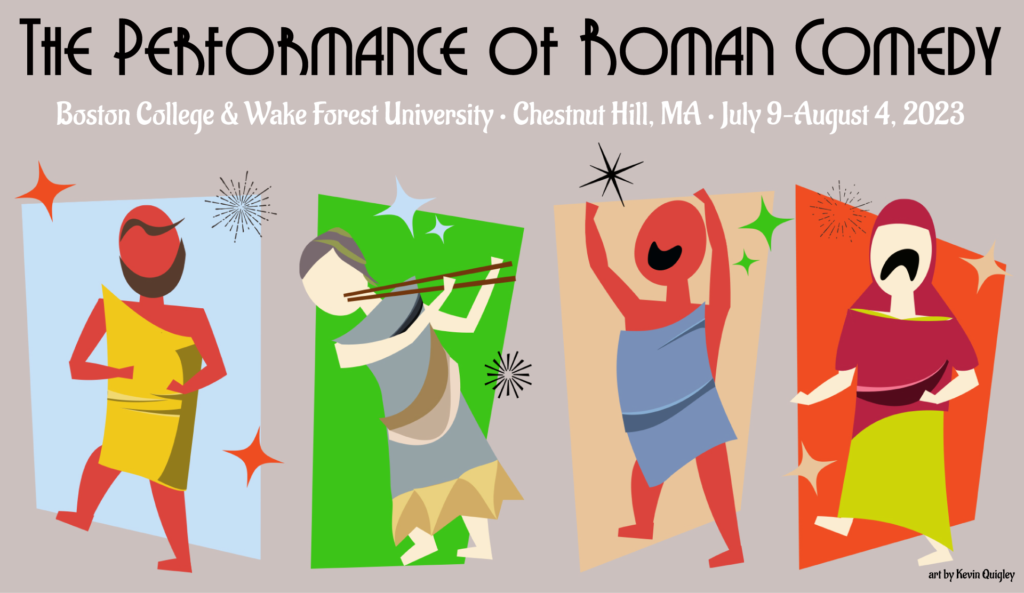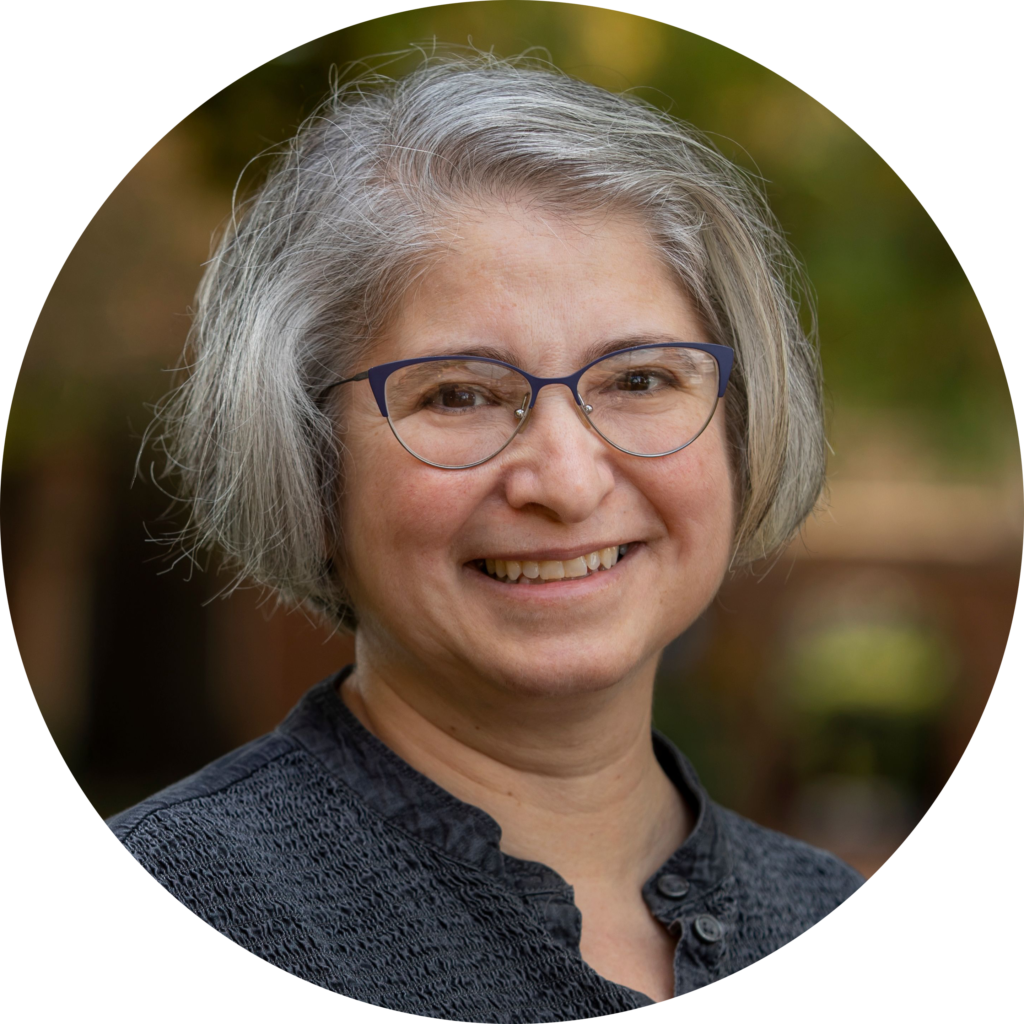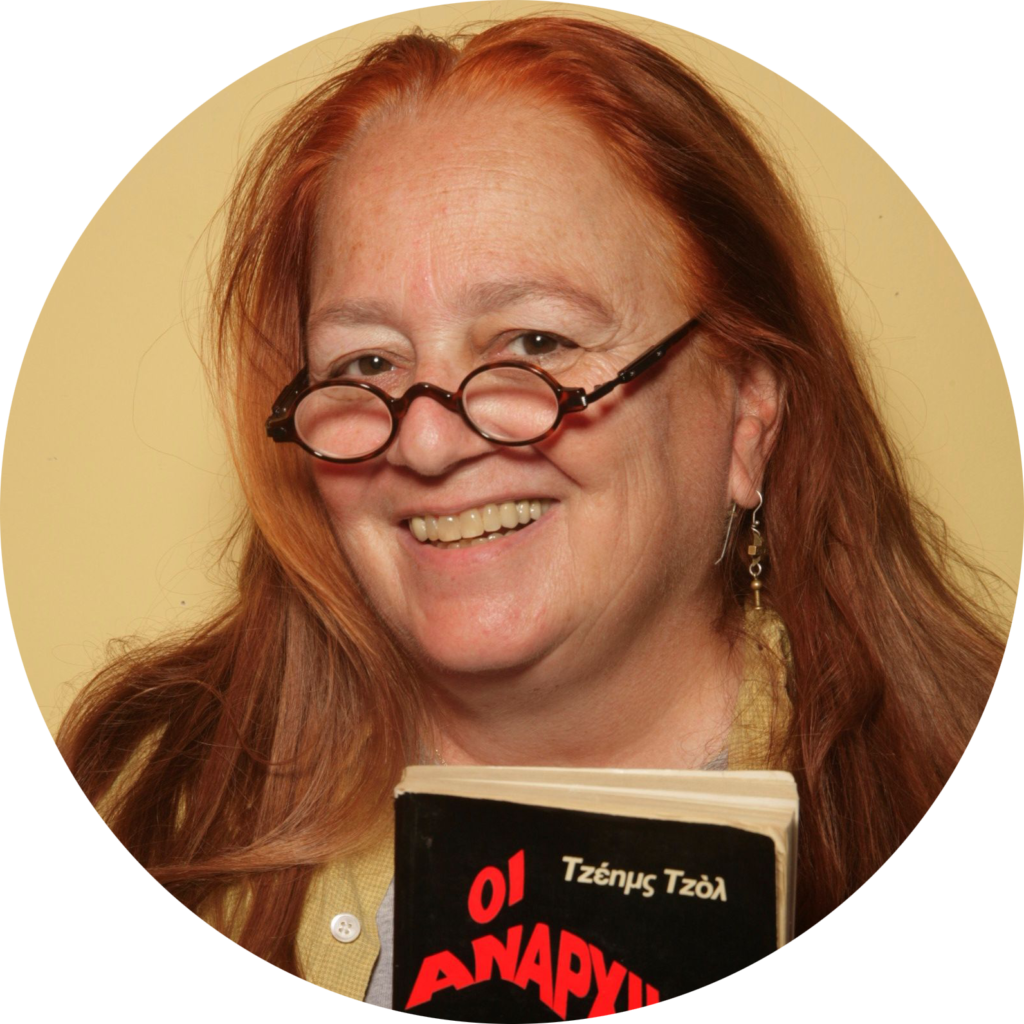Institute Team

Directors
T. H. M. Gellar-Goad

T. H. M. Gellar-Goad is Associate Professor of Classics at Wake Forest University. He earned his Ph.D. from the University of North Carolina at Chapel Hill. He has published numerous articles on Roman comedy, satire, elegy, and pedagogy, among other topics, and is the author of four books: Laughing Atoms, Laughing Matter: Lucretius’ De Rerum Natura and Satire (University of Michigan Press, 2020), Plautus: Curculio for the Bloomsbury Ancient Comedy Companions series (2021), A Commentary on Plautus’ Curculio (forthcoming, Michigan), and Masks (forthcoming, Tangent/Punctum Books). He is currently writing a book on religion in the comedies of Menander, Plautus, and Terence.
Christopher B. Polt

Christopher B. Polt is Associate Professor of Classical Studies at Boston College. He earned his Ph.D. from the University of North Carolina at Chapel Hill. He has published widely on Latin poetry, including articles on stage properties and performance in Roman comedy, animal fable, and ancient translation. His first book, Catullus and Roman Comedy: Theatricality and Personal Drama in the Late Republic (Cambridge University Press 2021), examines the reception of Roman comedy in the 1st century BCE. He is currently writing a book on C. S. Lewis’ engagement with and use of the Greek and Roman Classics.
Composer
Vanessa Stovall

Vanessa Stovall is an independent artist and interdisciplinary scholar of the classics. She received her bachelors in Classics from The Evergreen State College and her masters from Columbia University, studying ancient mythology in its musical performance contexts. She is currently pursuing a second masters in teaching from the University of Vermont, focusing on the reconstruction of ancient music with an emphasis on the role of hair and ornamental headgear in choral performances. She has composed two scores for ancient tragedies, for the 2021 Barnard-Columbia Ancient Drama Group production of Euripides’ Iphigenia in Aulis, directed by Elizabeth MacNamara, and the 2022 Whitman College production of Euripides’ Medea, directed by Anna Conser, and she is currently in the middle of finishing the music for two comedy productions for the spring of 2023: the BCADG production of Aristophanes’ Thesmophoriazusae, directed by Izzy Levy, and the University of Vermont production of Aristophanes’ Frogs, directed by Jeannette Chien. Her passions are centered on using ancient musical performance to encourage interest in classical drama outside of more-traditional philological contexts.
Musician
Dane Bennett

Dane Bennett is a second-year master’s student at the New England Conservatory of Music, earning the Presidential Distinction Award, and studying under Mark McEwen. He is an active member of the NEC Philharmonia and the NEC Wind Ensemble. Prior to attending NEC, Dane earned his B.M. in oboe performance at the University of Kentucky in 2022, where he studied under Dr. ToniMarie Marchioni and performed with the University of Kentucky Symphony Orchestra, the University of Kentucky Wind Symphony, and three undergraduate wind quintets. Dane has participated in masterclasses with Andreas Wittmann, Jaren Atherholt, Jared Hauser, Mary Lindsey Bailey, Nicholas Stovall, Elaine Douvas, Theresa Delaplain, and Titus Underwood. Over the past five years, Dane has attended the MasterWorks Summer Festival, Hidden Valley Oboe Seminar, and the Decoda Skidmore Chamber Music Institute. In 2018, Dane was a semifinalist in the Donald Runnicles Musical Arts Scholarship Competition at the Grand Teton Music Festival and graduated as a two-time John Philip Sousa Award winner from Worland, Wyoming.
Outreach Coordinator
Maya Chakravorty

Maya Chakravorty is a PhD candidate in the Classical Studies Department at Boston University. She graduated from the University of Toronto in 2014 with High Distinction, having completed a B.A. (Hons.) in Classics and Classical Civilizations. Her general research interests include archaic and imperial Latin literature, Latin prose, Roman historiography, cultural history, and ancient education. She is currently working on her dissertation, which examines the transmission of virtues and the conceptualization of Republican Roman heroes in the Imperial-era authors Silius Italicus, Juvenal, Plutarch, and Quintilian.
Film Editor
Haley Feiereisel

Haley Feiereisel is a junior at Wake Forest University. She is from Winston-Salem, North Carolina. She is majoring in Communications and double-minoring in Dance and French Studies. During her time at Wake Forest, Haley has enjoyed learning about and experimenting with the process of filmmaking.
Visiting experts
Peter Barrios-Lech

Peter Barrios-Lech is Associate Professor of Classics at the University of Massachusetts Boston. He earned his Ph.D. from Brown University. His current research interests are historical pragmatics, sociolinguistics, Latin and Greek syntax, and computational stylistics. He has published articles on puns, bilingualism, and social aspects of language in Roman comedy and is the author of Linguistic Interaction in Roman Comedy (Cambridge University Press, 2016).
Amy R. Cohen

Amy R. Cohen is Professor of Classics and Catherine Ehrman Thoresen ’23 and William E. Thoresen Professor of Speech and Theatre at Randolph College. She earned her Ph.D. from Stanford University. Her doctoral work focused on the interpretive implications of doubling and the three-actor convention in Greek tragedy. She has directed thirteen productions of ancient drama using original practices, twelve in the Whiteside Greek Theatre at Randolph College and one in Greece. From 2010–2017, she edited Didaskalia: The Journal for Ancient Performance.
Sharon L. James

Sharon L. James earned her Ph.D. from UC Berkeley. She is Professor of Classics at UNC Chapel Hill and an affiliated member of Comparative Literature and Women’s and Gender Studies. She has published widely on sex, gender, rape, teaching rape in ancient literature, Roman love elegy, and Roman Comedy. Her first book, Learned Girls and Male Persuasion (University of California Press 2003), studies Roman elegy from the perspective of the learned girl who is the object of sexual persuasion by male poets. She co-edited A Companion to Women in Antiquity (Blackwell, 2012), Women in Republican Roman Drama (University of Wisconsin Press, 2015), and Women in the Classical World (Routledge, 2017).
Seth Jeppesen

Seth Jeppesen is Associate Professor of Classical Studies at Brigham Young University. His research focuses on religious parody in Roman comedy, the modern reception and performance of ancient drama, and cultural diversity in the ancient Mediterranean, on which he has published several articles. He has directed and/or performed in seven productions of Greek tragedy and Roman comedy. He is currently finalizing a translation of Plautus’ Curculio for the University of Wisconsin Press’ The Complete New Comedies and a book on Plautus’ Trinummus for the Bloomsbury Ancient Comedy Companions series.
V. Sophie Klein

V. Sophie Klein earned her Ph.D. from Boston University. She has written several articles on ancient and modern performance, including a book on Plautus’ Menaechmi for Bloomsbury Ancient Comedy Companions. She has also written plays inspired by Classical literature and directed performances of ancient drama at Boston University and Boston College.
Matthew Leigh

Matthew Leigh is Professor of Classical Languages and Literature at Oxford University and Fellow and Tutor in Classics at St Anne’s College, Oxford. He earned his D.Phil. from Oxford University and is the author of Comedy and the Rise of Rome (Cambridge University Press, 2004), Lucan: Spectacle and Engagement (Oxford University Press, 1997), From Polypragmon to Curiosus: Ancient Concepts of Curious and Meddlesome Behaviour (Oxford University Press, 2013), and The Masons and the Mysteries in 18th Century Drama (DeGruyter, 2019). He has produced a translation of Plautus’ Pseudolus, which he uses in performance-based teaching, and is working on a larger project using antebellum American memoirs by enslaved authors as a way to think about the ideological work done by Roman comedy.
C. W. Marshall

C. W. Marshall is Professor of Greek at the University of British Columbia in Vancouver, Canada. His research focuses on the stagecraft and performance of ancient theater. His first book, The Stagecraft and Performance of Roman Comedy (Cambridge University Press, 2006), provided the first overview of Roman stagecraft in over fifty years. Subsequent books on Greek drama have examined Euripides’ Helen, Aeschylus’ Libation Bearers, and Aristophanes’ Frogs. He is currently working on a study of comic routines in Roman comedy. In 2021, he was elected as a Fellow of the Royal Society of Canada.
Rachel Mazzara

Rachel Mazzara is a Visiting Assistant Professor of Classics at the College of Saint Benedict and Saint John’s University, specializing in the form and genre of Roman comedy. She received her Ph.D. from the University of Toronto. She has published on self-referentiality and the interactive relationship that Plautus’ plays cultivate between the performance and its audience, including how metageneric effects invite viewers to collaborate imaginatively in playwrighting and dramatic production.
Deepti Menon

Deepti Menon is a professional translator and Web Editor for the British Comparative Literature Association. She received her Ph.D. from the University of California, Santa Barbara. Her research focuses on multilingualism, intertextuality, ancient staging, and metatheater. She is working on an article on cultural hybridity in Plautus’ Poenulus based on her dissertation.
Erin K. Moodie

Erin K. Moodie is Assistant Professor of Classics at Purdue University. She earned her Ph.D. from the University of Pennsylvania. Her research interests include Greek and Roman comedy, Greek and Roman social history, Roman satire, and Lucian. She is the author of Plautus’ Poenulus: A Student Commentary (University of Michigan Press, 2015) as well as several articles on Greek and Roman comedy and Roman satire, and her monograph Comic Subversion: Metatheater in Athens, Rome, and Beyond is currently under review.
Timothy J. Moore

Timothy J. Moore is John and Penelope Biggs Distinguished Professor of Classics at Washington University in St. Louis. He received his Ph.D. from the University of North Carolina and has taught at Harvard, Texas A&M University, the University of Texas at Austin, the University of Colorado, and the Ruhr Universität in Bochum, Germany. His publications include The Theater of Plautus; Music in Roman Comedy; Roman Theatre; two edited volumes on Greek and Roman comedy; an online database of the meters of Roman Comedy; and articles on Greek and Roman music, theater, and literature, the teaching of Greek and Latin, American musical theater, and Japanese comedy. Current projects include a long-range study of musical theater in ancient Greece and Rome. He has received fellowships and grants from the American Academy in Rome, the National Endowment for the Humanities, the Alexander von Humboldt Foundation, the Mellon Foundation, the Loeb Classical Library Foundation, the Center for the Humanities at Washington University in St. Louis, and the Center for Hellenic Studies.
Dan-el Padilla Peralta

Dan-el Padilla Peralta is Associate Professor of Classics at Princeton University, where he is affiliated with the Programs in Latino Studies and Latin American Studies and the University Center for Human Values. He earned his Ph.D. from Stanford University and is the author of Undocumented: A Dominican Boy’s Odyssey from a Homeless Shelter to the Ivy League (Penguin, 2015) and Divine Institutions: Religions and Community in the Middle Roman Republic (Princeton University Press, 2020), and he has co-edited Rome, Empire of Plunder: The Dynamics of Cultural Appropriation (Cambridge University Press, 2017). Current projects include a co-authored study of 338 BCE and the origins of Roman imperialism (under contract with Harvard University Press), A People’s History of Rome (under contract with Princeton University Press), a co-edited volume on new approaches to the Middle Roman Republic, and a co-authored manifesto on race and racism in the disciplinary identity of Classics.
Amy Richlin

Amy Richlin is Distinguished Professor of Classics at UCLA. She earned her Ph.D. at Yale University. Her books include The Garden of Priapus: Sexuality and Aggression in Roman Humor (Yale University Press, 1983), Arguments with Silence: Writing the History of Roman Women (University of Michigan Press, 2014), and Slave Theater in the Roman Republic: Plautus and Popular Comedy (Cambridge University Press, 2017). She has published translations of Plautus in Rome and the Mysterious Orient (University of California Press, 2005) and her translation of Plautus’ Rudens was performed at the Getty Villa (2007). She served as dramaturg for Getty productions of Plautus’ Haunted House (2016) and Aristophanes’ Lysistrata (2021).
Niall W. Slater

Niall W. Slater is the Dobbs Professor of Latin & Greek in the Department of Classics at Emory University. After receiving his Ph.D. from Princeton, he taught at Concordia College (Moorhead, Minnesota) and the University of Southern California before arriving at Emory, where he received the Emory Williams Award for Distinguished Teaching at Emory in 1999. His books include Euripides: Alcestis (Bloomsbury, 2013); Spectator Politics: Metatheatre and Performance in Aristophanes (University of Pennsylvania Press, 2002); Reading Petronius (Johns Hopkins University Press, 1990); and Plautus in Performance: The Theatre of the Mind (Princeton University Press, 1985). He is a past president of the Classical Association of the Middle West and South as well as past president of the national Phi Beta Kappa Society.
Serena S. Witzke

Serena S. Witzke is Visiting Assistant Professor of Classical Studies at Wesleyan University. She earned her Ph.D. at UNC-Chapel Hill. She has published numerous articles on ancient comedy, gender and sexuality, and reception studies. She also serves as editor of Diotíma, an online resource for information on women, gender, sex, sexualities, race, ethnicity, class, status, masculinity, enslavement, and disability in the ancient Mediterranean world.
Digital team
Heather Barnes

Heather Barnes is the Digital Curation Librarian at ZSR Library. Her core focus is providing research data curation services and addressing data lifecycle questions for faculty digital scholarship projects.
Kyle Denlinger

Kyle Denlinger is the Digital Pedagogy & Open Education Librarian at Wake Forest University’s Z. Smith Reynolds Library. In this role, he works with faculty to design and manage digital class projects, with a specific focus on digital publishing and the creation of open educational resources.
Carrie Johnston

Carrie Johnston is the Digital Humanities Research Designer at Wake Forest University’s ZSR Library. In this role, she supports the incorporation of digital tools and methods into innovative humanities scholarship.
Molly Keener

Molly Keener is the Director of Digital Initiatives & Scholarly Communication at the Z. Smith Reynolds Library, Wake Forest University. She provides guidance on copyright, author rights, open access, and scholarly publishing, and heads the department that collaborates with faculty on using digital tools and methods in their scholarship and instruction.
The Performance of Roman Comedy has been made possible by a major grant from the National Endowment for the Humanities: Democracy demands wisdom.

Any views, findings, conclusions, or recommendations expressed in this program do not necessarily represent those of the National Endowment for the Humanities.
